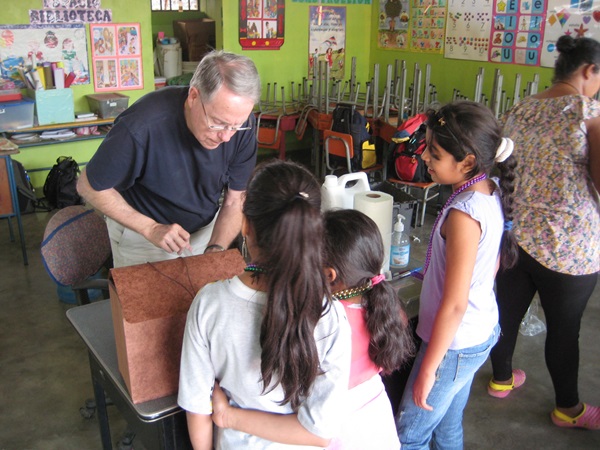For many United Methodists, faith is something that cannot be contained. Their faith ignites a passion for serving others. They take seriously the passages in James 2 that say faith is shown through works.
For two men – one a physician, the other an active retiree – two of The United Methodist Church's four areas of focus are especially ingrained in their lives: abundant health and ministry with the poor.
For both, the emphasis is on "with" – standing with those who are regarded as "the least of these," listening to them, understanding their needs and aspirations, and working with them to achieve their goals, whether it be by providing medical care or securing a birth certificate.
In the Wesleyan tradition, their Christian faith is not a solitary journey. They are part of a larger community of people of faith who work to bring healing and dignity to those often lacking both.
Medical missions
Physician Don Skillman is an infectious disease specialist from Helena, Montana. For almost 15 years, he has led mission teams to areas where people desperately need medical care. Along with medicine, he and his teams bring the love, touch and encouragement that comes when God's people do God's work.
"I tell people who go on the medical mission trips with me that I can't promise the trip will be life-changing," Skillman said, "but usually, it is."
Photographs tell his own story. "In hundreds of pictures from these trips, I'm always smiling. I love this ministry. It's so rewarding to help people who need it. It makes my whole Christian experience so much more. I'm at my best when I'm on a trip."
Skillman, a member of St. Paul's United Methodist Church in Helena, has led more than a dozen trips to countries like Brazil, Mozambique, Haiti and Honduras, and to New Orleans to help local people suffering from tropical diseases.
"We treat so many people," he said. "They need basic medicine. Everyone has worms and parasites. Most have bad teeth."
In Brazil, Skillman and his teams work from the John Wesley Hospital Boat, calling it a "crucial part of medical ministry to the people in the Amazon."
With the expressed purpose of providing medical and dental assistance for villages in the Amazon, the boat is a much-needed clinic supported in part by giving through the Advance, the denomination's designated giving channel. Skillman said, "It stops in villages all along the Amazon. Brazilians (from outside the Amazon waterway and rainforest) are not likely to go into the Amazon. They see the area as primitive, dangerous, disease-ridden and snake- and mosquito-infested."
Skillman said the people he and his teams see are appreciative that the volunteers have come and are generous with the little that they have.
"What is the most humbling for me, though," he said, "is realizing the impact just our presence has on their lives. In a while, they won't remember our names or what we looked like, but they will never forget that we considered them so important that we would come. We elevate their self-esteem just by coming from America. It blows the kids' minds that someone from America would come and play with them. It reminds me of what John Wesley said, ‘Don't send help to the poor. Take it to them.'"
Skillman said that without exception, as the medical team volunteers are leaving, they talk about what the trip has meant to each one. "So many don't have words, just tears."
Serving homeless people
Bart Perkey has volunteered with various ministries to homeless people for more than 30 years.
"As you become acquainted with some of the people who are homeless, you become aware of how fragile life can be in our culture," Perkey said. "We tend to think that people are poor and homeless because they don't apply themselves or choose unhealthy behaviors. Sometimes that is true, but not always. For many, circumstances out of their control brought them to their current situation."
Before he retired in 2014, Perkey, a member at Belmont United Methodist Church in Nashville, Tennessee, had been a volunteer with Room in the Inn. The ministry of Nashville area churches is best known for offering homeless people nightly housing, meals and safety during the cold months of the year.
Since retirement, he volunteers with Room in the Inn's main office three days a week, five hours a day, working directly with homeless people to help them get identification cards or birth certificates, arranging for transportation to doctor visits and meeting a variety of other needs.
"It's not always a lot of fun," Perkey said. "Working with poor people can be challenging. A lot of days, I get angry. Some of the people we deal with are not pleasant people. I find it sometimes takes a lot of self-discipline for me to remain pleasant, smile and help them understand what I can or cannot do to help them."
Perkey said he knew that when he retired he would need other activities to make him feel productive.
"A lot of my motivation for doing volunteer work is for my own mental and spiritual health," he said. "If I get up every day, go out and engage in a useful and meaningful activity, I feel good about myself. It's almost selfish on my part. I'm a student of Jesus and his teachings. You can't see his life and not feel a sense of calling on your own."
Polly House is a freelance writer and editor, who is now serving as editorial assistant for Interpreter and Interpreter OnLine. She lives in Nashville, Tennessee. Originally published in Interpreter magazine, March-April 2017.

